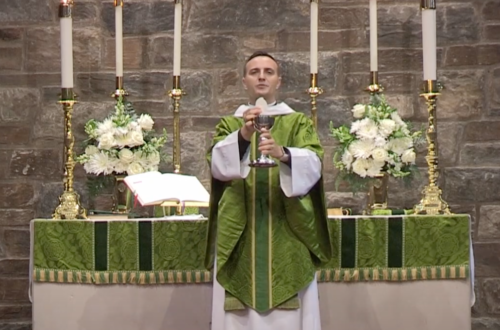Treading the way of love like Christ
Only a few weeks ago, my husband Bryan and I were blessed to spend a whole week on the beach at the Outer Banks. The vastness of the ocean with water stretching as far as the eye can see, or the sound of the waves crashing against the coast, or that never-ending flow of water that brings with itself onshore a whole host of gifts from the sea each morning, or even that peaceful ambience that just fills my heart when sitting on the beach late at night, they all bring me closer to God. There is something about the sea that has always made me marvel about my own life and God’s love in creation.
That week on the beach has also reminded me of one of my life’s most enduring hobbies – swimming. Already as a small 8-year-old child, my day would start at 7 a.m. swimming at the pool with my teammates each morning. Through most of my primary and middle school, I would swim 3 hours a day, 6 days a week. I love swimming. But getting to know how to swim was hard. Perhaps even more so when my journey with that sport started with my father casually pushing me, at the age of 5, into a pool with no floats whatsoever. Let’s just say, I won’t be repeating my father’s mistakes on this one.
Swimming is one of those sports that when done professionally requires one to follow a lot of different rules and best practices. I remember it took me about two years to even swim in a way that I would feel comfortable about my stroke. Mastering the butterfly technique took at least another two or three years. One could go on forever about the proper arm action, butterfly kick, head position and the breathing technique or even the most efficient way to turn when you touch the end of the pool. There are so many rules about body posturing, water drag, and movement that it takes a lot of time, effort and also oversight of someone who can see you swim, to get all the things right. And yet, underlying all these rules is the most important rule of all, and that is to allow yourself to relax your body muscles and to trust that you will comfortably float on water. It sounds awfully simple and straightforward to anyone who can swim well but following that simple rule and learning that skill at first can be hard.
Now, living lives that are holy and pleasing to God requires following lots of rules too, particularly when you’re a pious Jew. Commentators on the Torah, the first five books of the Old Testament of which Leviticus is one, argue that there are some over 600 commandments of varying importance and applicability. Scholars and scribes would endlessly argue over which commandment takes precedence over others, or whether each one of them was equally necessary for obtaining holiness in one’s life. Therefore, it is rather unsurprising that during Jesus’s time teaching at the temple in Jerusalem following his triumphal entry into the city, one of the Pharisees, who was also a lawyer, would test Jesus about his understanding of the law and the prophets. “Teacher, which commandment in the law is the greatest?” he asked.
Jesus’s response was not only brilliant, but it was so much in line with the orthodoxy of the Jewish faith that the Pharisees, Sadducees and the scribes did not dare to continue arguing with him. In his answer to the question, Jesus quotes two sections from the Torah. First comes the most important passage in all of the Jewish scriptures, the so-called Shema Israel from the Book of Deuteronomy 6:5 – “Hear, O Israel: The Lord is our God, the Lord alone. You shall love the Lord your God with all your heart, and with all your soul, and with all your might.” The love of God is not only a commandment given to us; it is also our ultimate destiny. God that is love overflowing created us out of love, continues to bless us and our lives with love, and eventually calls us into love itself, for it is in love that we come to be united with God who is love. Jesus is aware, however, that the ultimate test of our love of God lies in our love for those around us. “You shall love your neighbour as yourself,” says Jesus quoting Leviticus 19:18. “On these two commandments hang all the love and the prophets.”
This Summary of the Law, a term often used by Anglicans to name this passage of Scripture, perfectly encapsulates our Christian faith and shows us the way to holiness in life. As Christians, we are called into lives that are holy, lives marked by love. But just as for the people of Israel, so also for us, the word “holy” means much more than that that is unapproachable or perfect. Jacob Milgrom, a professor of Hebrew Scripture at the University of California at Berkeley, argues that holiness
“becomes a positive concept, an inspiration and a goal associated with God’s nature and his desire for humans to be holy: ‘You shall be holy… for I am holy’. That which humans are not and can never fully be, but which they are commanded to emulate and approximate is what the Bible calls ‘holy’. Holiness means imitatio Dei – the life of godliness.”
How do we then imitate God?
In order to answer this question, we as Christian must always look to the life and witness of our Lord and Saviour Jesus Christ. God in Jesus loved us so much that even from the time of his conception and birth, he showed us that all flesh, even human flesh, is both holy and sacred for it is created in God’s own image and betrays to us God’s own love for us. Throughout his life and ministry, Jesus acted out of love healing, teaching and feeding the people. Jesus also brought God’s own love into all the broken and hurting places in the world; be it the houses of sinners and Roman tax collectors, or even into the lives of prostitutes and the outcast. Finally, it is in that Upper Room in Jerusalem, where Jesus sat down to his Last Supper with his disciples sharing the bread and wine with them, that we come to see the main reason why we are called to love. After having washed the feet of each of the disciples, Jesus said to them: “Just as I have loved you, you also should love one another. By this everyone will know that you are my disciples, if you have love for one another.” Our love of God and one another will always be a response to God’s own love for us. God’s love for us always comes first. Jesus “stretched out his arms of love on the hard wood of the cross so that everyone might come within the reach of his saving embrace.”
Will we respond with love? And what kind of response would that take?
Living a holy life must always take the form of us treading the way of love like Christ. Jesus being a good, pious Jew lived and taught others to live a life in accordance with God’s commandments. Here again, our reading from Leviticus offers us clear guidance on that path, a path that Jesus tread himself. And despite its priestly, archaic language, Leviticus provides us with some very practical considerations that seem to be incredibly appropriate for our time, perhaps even more so now ahead of the elections.
“You shall not render unjust judgement.” At a time when the property of Breonna Taylor’s neighbour is deemed more valuable than her own life, that commandment should reverberate in our ears and call us into action, into protest. Faced with the spread and legitimisation of white supremacy amidst the pandemic of racial injustice by those in power, we as Christians must speak with one voice that Black Lives Matter. The lives of our African American sisters and brothers are met with unjust judgment and treatment on a daily basis and in all aspects of their lives. Despite the pronouncements to the contrary, systemic racism in the United States is real and it is a deep wound on this nation, one that we should feel absolutely compelled to try healing with God’s love.
“You shall not go around as a slanderer among your people.” “You shall not hate in your heart anyone of your kin.” “You shall not take vengeance or bear grudge against any of your people.” How appropriate are these commandments at a time when a tweet or a Facebook post can literally ruin someone’s life and livelihood; when people find it acceptable for our politicians and people of public trust to purposefully spread lies and disinformation; when conspiracy theories spread to distract the public attention from the things that matter. Do I find myself capable of love, when someone persistently pushes my buttons and responds to my posts online in a threatening or argumentative way? Do I find myself capable of love towards those with whom I seem to have nothing in common and who completely disagree with me on matters of politics and culture? That’s really hard work and God knows how often I struggle with it.
“You shall not profit by the blood of your neighbour.” Or, as some other scholars translate this passage: “you shall not stand idly by when you neighbour is in danger.” The pandemic of the coronavirus has proven that some communities within our country are disproportionately affected by its reality. We have clapped our hands for those essential workers, who despite the risk to their health, continue to offer us medical help, deliver our Amazon packages, staff grocery store counters, or clean our houses. And yet it is those same very people, who work on wages that often put them below the poverty line. Those same people line outside our churches asking for food. Those same people get evicted from their houses. Who in our society has benefitted from this pandemic? And will we call for change to the unjust economic structures that these folks seem to find themselves trapped in?
And finally, one other commandment found in this 19th chapter of Leviticus that our lectionary omits today. In verses 33-34, the Lord spoke to Moses: “When an alien resides with you in your land, you shall not oppress the alien. The alien who resides with you shall be to you as the citizen among you; you shall love the alien as yourself, for you were aliens in the land of Egypt: I am the Lord your God.” The commandment of love must never stop short of those who are foreign to us. Sadly, our world today is struggling with a global resurgence of nationalism. Interests of a state and its citizens are once again elevated above the needs of those who seek refuge from wars, crime, abuse, poverty, and hunger. The Episcopal Church has proudly supported refugees throughout American history because Christ offers us a path that recognises no national distinction. In Jesus’ eyes, there is no difference between Americans, Guatemalans, Poles; citizens or undocumented immigrants.
Christ’s love was radical. You would rarely find him in the house of a respected politician or a religious leader of the time. He healed the lepers that were expelled from local communities. He defended a prostitute, whom the society wanted to stone. He didn’t come to those of his own family or nation but all the humanity. He did not even care for Jewish custom and chose to reveal himself to the Samaritan woman at the well – an epitome of a foreigner. In a similar way, through our baptism into the Body of Christ, we are called to love and serve everyone we come across in our lives. Perhaps most importantly those who hunger, who are in thirst, are ostracised, or rejected by society.
No matter what our political leanings might be, these are the hallmarks of Jesus’ life that should dictate what sort of a country we envisage for ourselves in this election. Today, God invites us to open our hearts to the Spirit and ‘take this risk of love and solidarity’ (Williams 2014, 6). Our Baptismal Covenant calls us to reconcile with one another despite our differences so that God’s love and God’s kingdom in the world may spread. And so, in the words of Saint Augustine:
“Love and do what you will. If you keep silence, let it be for love. If you speak, let it be for love. If you correct someone, correct for love. If you pardon, pardon for love. Cherish the root of love in the depth of your heart. From this root, nothing but good can come.”
Amen.
21st Sunday after Pentecost, Proper 25, Year A | Leviticus 19:1-2,15-18 • Psalm 1 • 1 Thessalonians 2:1-8 • Matthew 22:34-46



